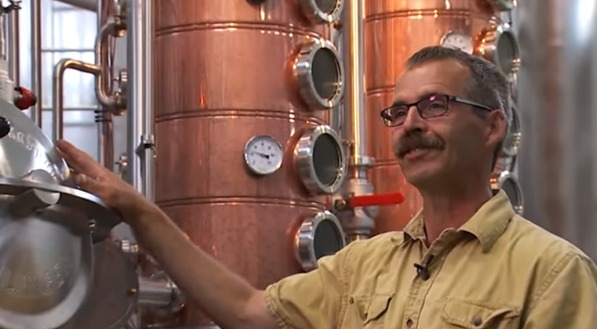You can’t make whiskey without enzymes—and at Black Fox Distillery, enzymes are put to work throughout the production process, from distillation to descaling equipment.
In any distilling process, the starch in the grain or vegetable must be converted to sugar. Malt barley has long been the source of amylase, the enzyme that does most of that work. But at Black Fox, owner John Coté is looking for ways to feature the quality and flavour of his grains without adding malt.
“We are using amylase enzymes made from bacterial and fungal sources,” he says. “Adding barley malt also adds malt flavour, and when you are trying to make the ‘quintessential Canadian whiskey’, made with 100% rye, you don’t want that. We can’t show off the quality of our grain without using enzymes.”
Coté adds, “Beta-glucanase and alpha-amylase help with the breakdown of starches to 100% glucose, something that would not be possible without the use of enzymes.”
Black Fox is an on-farm distillery: they grow the grain they use to make their spirits. They are constantly looking for ways to streamline their production and create a cradle-to-cradle process.
“Large distilleries are doing a good job of becoming more efficient. They need to because of the effluents they create. With the small distilleries, they sometimes have trouble managing the processes. Sometimes you can’t afford to optimize as a small distiller,” says Coté.
“In our case, we don’t have the luxury of being tapped into a sewage system and running things down a drain for someone else to deal with. When you have to think about where it ends up, you have to be creative with your solutions. Enzymes are a huge part of that.”
To that end, the distillery uses citric acid as a cleaner, because the sludge can be composted and actually helps balance the pH of the farm’s alkaline soil. Protease breaks down protein build-up on machinery. Traditional protein descalers create a foaming problem; using protease eliminates the need for anti-foaming agents. And that sludge can also be composted and added as a soil amendment.
“Enzymes are far more environmentally benign than other chemicals,” says Coté. “There are biological answers to a lot of the problems we have, whether carbon-, nitrogen- or phosphate-based.” Enzyme development is evolving in a similar manner to crop breeding these days, says Coté. At Black Fox they are finding new ways to use them all the time.
Phil Stephan, Vice President of Strategic Initiatives at the Saskatchewan Research Council (SRC) is in full agreement with Coté. “We now have the technology and tools to explore the micro-world for new discoveries and characterize what these microbial enzyme factories do. We’re ‘bio-prospecting,’ seeing what nature is already doing and trying to isolate those microbes and put them to work to decrease environmental impact.”
While distilleries like Black Fox have long been aware of the importance of enzymes in the distilling process, other industries are also eager to discover what enzymes can do for them. “The use of enzymes runs across the board, from therapeutic applications in the medical and veterinary fields, textiles, and energy,” says Stephan.
With organizations such as SRC getting better at isolating and producing them, and research focused on nature’s chemicals, enzymes from yeasts and microbes are a non-toxic, biodegradable alternative to many conventional chemicals. Raise your glass of Black Fox whiskey to these natural workhorses!
Noelle Chorney is a writer based in Saskatoon, SK.
Photo credit: maxTVlocal video